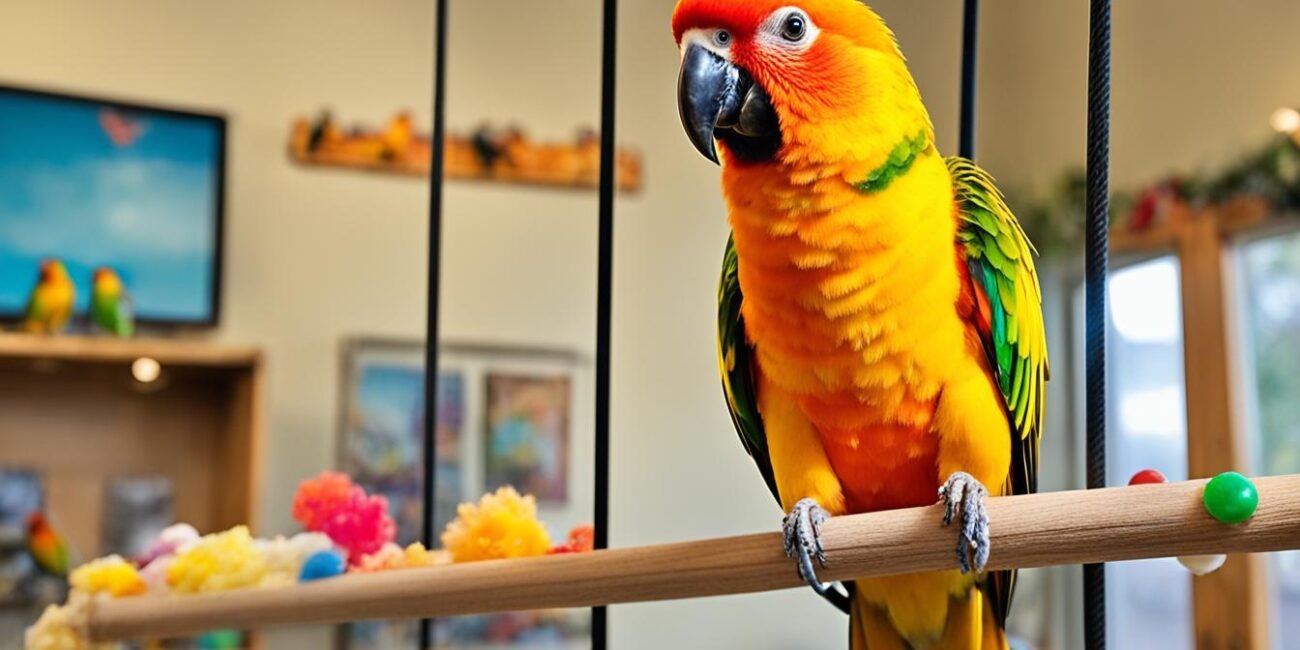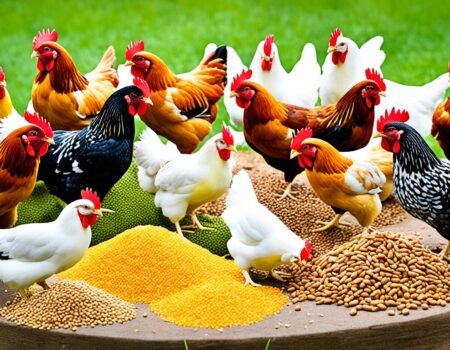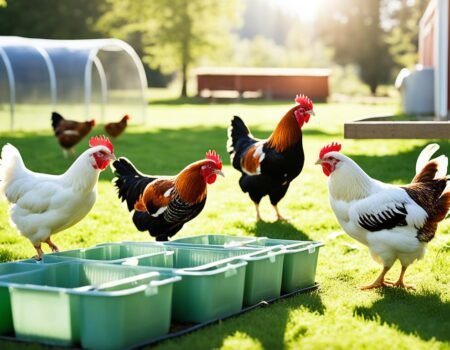Sun Conure Care Guide: Tips for a Happy Bird
As a proud owner of a sun conure, I understand the joy and responsibility that comes with caring for such a vibrant companion. Sun conures are small parrots known for their vivid plumage and playful nature. With the right care and attention, these beautiful birds can thrive and bring happiness to your loving home.
To ensure the well-being of your sun conure, there are essential factors to consider. Socialization, attention, and exercise are key for their overall happiness. By understanding their body language and behavior, you can prevent potential biting incidents and foster a strong bond with your feathered friend.
Providing a spacious habitat is vital. A minimum cage size of 30″ W x 30″ D x 36″ H is recommended, along with essential supplies such as food and water dishes, perches, toys, and a mist spray bottle for bathing. Regular cleaning and maintenance are necessary to keep their habitat clean and hygienic.
A balanced diet is crucial for the health and nutrition of your sun conure. This includes high-quality pellets, fresh fruits, and vegetables. Regular exercise and mental stimulation are also important to prevent boredom and feather picking.
In this comprehensive care guide, I will provide you with expert tips and insights on everything you need to know to ensure your sun conure thrives and lives a happy and fulfilling life in your home.
Key Takeaways:
- Sun conures are vibrant companions known for their colorful plumage and playful personalities.
- Proper care, socialization, and exercise are essential for their well-being.
- A spacious habitat and essential supplies are necessary for their comfort.
- A balanced diet of high-quality pellets, fruits, and vegetables is crucial for their health.
- Regular exercise and mental stimulation are key to prevent boredom and feather picking.
Sun Conure Species Overview
Sun conures are vibrant members of the parrot family known for their colorful plumage and playful personalities. They belong to the Aratinga genus and are scientifically named Aratinga solstitialis. These small parrots, native to South America, have captured the hearts of bird enthusiasts worldwide. With their stunning yellow, orange, and green feathers, sun conures are truly eye-catching creatures.
One of the remarkable qualities of sun conures is their lifespan. With proper care and a nurturing environment, they can live for 20 years or more, making them a long-term companion for bird lovers.
It is fascinating to observe the growth and transformation of sun conures. As juveniles, their feathers have an olive-green hue, gradually transitioning to the vibrant yellows and oranges that they are famous for around the age of 6 months. This colorful plumage is a trademark feature of the species and brings joy to all those who witness it.
When it comes to the complexities of identifying individual sun conures, it can be challenging to distinguish between males and females based on their appearance alone. In some cases, a blood test may be necessary to determine the bird’s gender accurately.
Sun conures are known to be expressive and vocal creatures. They communicate through a range of calls, from soft chirps to loud squawks. These sounds serve various purposes, including establishing territory and attracting the attention of their human companions. It is essential for sun conures to receive adequate attention and engage in regular exercise to keep them mentally stimulated and reduce excessive vocalization.
While sun conures make delightful pets, it’s crucial to offer proper socialization and supervise their interactions outside of their habitat. Their curiosity and adventurous nature can sometimes lead to unforeseen situations, so it’s important to ensure their safety at all times.
Sun Conure Characteristics
Sun conures are vibrant and energetic birds that require intermediate care to thrive. With proper care, they can live up to 20 years or more, providing years of companionship and joy.
On average, sun conures reach a size of 10-13 inches from head to end of the tail. Their small yet vibrant presence adds a splash of color to any home.
Their diet consists of granivorous food, which means they primarily eat grains. However, it’s important to provide a well-rounded diet that includes a variety of seeds, nuts, fruits, and vegetables to ensure their nutritional needs are met.
To accommodate their active nature, a minimum habitat size of 30″ W x 30″ D x 36″ H is necessary. This provides ample space for them to move, climb, and spread their wings.
“Sun conures are fascinating and beautiful birds that require dedicated care and attention. They thrive in an environment that offers plenty of mental stimulation, exercise, and social interaction.”
Providing a suitable environment and engaging with them regularly will ensure a happy and healthy sun conure. They are intelligent creatures that enjoy interactive toys and human interaction.
Comparison of Sun Conure Characteristics
| Characteristic | Sun Conure |
|---|---|
| Difficulty of Care | Intermediate |
| Average Life Span | 20 years or more |
| Average Size | 10-13 inches |
| Diet | Granivorous food with a variety of seeds, nuts, fruits, and vegetables |
| Minimum Habitat Size | 30″ W x 30″ D x 36″ H |
Understanding these characteristics is crucial for providing the best care for your sun conure. By meeting their needs and creating a stimulating environment, you can ensure they live a happy and fulfilling life.
Sun Conure Supply Checklist
To keep a sun conure happy and healthy, I recommend having the following supplies on hand:
Habitat
Provide an appropriately sized habitat for your sun conure. The minimum size for a single bird should be 30″ W x 30″ D x 36″ H. It should be spacious enough for your conure to move around comfortably.
Conure Food
Choose a high-quality conure food that is specifically formulated for their nutritional needs. Pelleted food should make up the majority of their diet.
Treats
Include millet spray as a healthy treat for your sun conure. It adds variety to their diet and can be used as a reward during training sessions.
Supplements
Provide a cuttlebone and a millet holder in your sun conure’s habitat. Cuttlebone helps support their beak health, and the millet holder can hold a millet spray for your conure to nibble on.
Habitat Paper
Use habitat paper or litter to line the bottom of your conure’s habitat. This makes cleaning easier and helps maintain a clean and hygienic environment.
Food and Water Dishes
Include sturdy and easy-to-clean food and water dishes in your sun conure’s habitat. Make sure they are accessible and placed securely.
Perches
Provide perches of assorted sizes in the habitat to give your conure a variety of surfaces to perch on. Natural wood perches are a great choice as they provide a more comfortable grip.
Toys
Offer a variety of toys to keep your sun conure mentally stimulated and entertained. Toys that encourage foraging, climbing, and chewing are particularly beneficial.
Mist Spray Bottle
A mist spray bottle is essential for providing your sun conure with regular bathing. Mist the feathers lightly to help them maintain healthy plumage.
Bird Nail Trimmer
Invest in a bird nail trimmer to keep your sun conure’s nails at a safe length. Regular trimming prevents discomfort and potential injury.
Play Gym
Set up a play gym outside of your conure’s habitat to provide them with additional exercise and enrichment opportunities. Include perches, toys, and other interactive elements.
In addition to these supplies, always monitor your sun conure’s overall well-being and provide appropriate care and attention for their specific needs.
Sun Conure Habitat
Choosing the right enclosure is crucial for a sun conure. The ideal habitat size for a single bird should be at least 30″ W x 30″ D x 30″ H, providing enough room for them to move around and spread their wings comfortably.
Stainless steel cages are recommended for sun conures due to their durability and safety. They are resistant to rust and corrosion, ensuring a long-lasting and secure environment for your feathered friend.
When selecting a location for the habitat, it’s important to consider a few factors. Place the cage in a draft-free area away from windows and direct sunlight to avoid temperature fluctuations. Sun conures thrive in well-lit spaces but should be protected from direct exposure to sunlight, as it can cause overheating.
It’s crucial to avoid keeping different species of birds in the same habitat, as they may have different requirements and could potentially harm each other. However, if you choose to keep multiple sun conures, introduce them gradually and monitor their interactions.
Providing appropriate bedding is essential for your sun conure’s comfort. Use materials such as paper-based bedding or wood shavings, making sure they are non-toxic and safe for your bird.
Sun conures love to perch and explore their surroundings. Incorporate various-sized perches in the habitat to encourage natural behaviors and exercise. Different textures such as natural wood or rope provide stimulation and support foot health.
To keep your sun conure entertained, add a variety of toys to their habitat. Toys that promote foraging, chewing, and climbing are especially beneficial. Remember to rotate the toys regularly to keep them engaged and prevent boredom.
Water and food dishes should be easily accessible for your sun conure. Opt for sturdy dishes and ensure they are cleaned regularly to maintain hygiene.
Cleaning and maintenance are necessary to keep the sun conure’s habitat clean and safe. Regularly remove any droppings, debris, or uneaten food. Deep clean the enclosure at least once a month, using bird-safe cleaners. This helps minimize the risk of bacteria and keeps your sun conure healthy.
| Essentials for a Sun Conure Habitat |
|---|
| Stainless steel cage |
| Bedding materials (paper-based or wood shavings) |
| Various-sized perches |
| Toys for stimulation and enrichment |
| Food and water dishes |
| Cleaning supplies (bird-safe cleaners) |
Sun Conure Diet & Nutrition
Sun conures require a nutritious and well-balanced diet to thrive and maintain optimal health. Providing them with the right combination of foods ensures they receive the necessary nutrients for their vibrant feathers and overall well-being.
Pelleted food should make up the majority of a sun conure’s diet, accounting for approximately 60-70% of their daily intake. Opt for high-quality conure-specific pelleted food, as it is specially formulated to meet their nutritional needs. Pellets provide a balanced and complete source of vitamins, minerals, and proteins that are important for their growth and vitality.
Key Points for Sun Conure Diet:
- Include pelleted food as the main component of their diet, comprising 60-70% of their daily intake.
- Choose a high-quality conure-specific pelleted food to ensure they receive essential nutrients.
- Supplement their diet with fresh fruits and vegetables to provide additional vitamins and minerals.
- Offer treats occasionally to add variety and mental stimulation.
- Never share food from your mouth or plate with your sun conure as it may contain harmful substances or excessive salt.
- Always provide fresh, clean water for hydration.
Alongside pelleted food, it’s important to include a variety of fresh fruits and vegetables in their diet. This ensures they receive a wide range of vitamins, minerals, and antioxidants. Some suitable fruits and vegetables for sun conures include:
- Mangoes
- Papayas
- Apples
- Berries
- Grapes
- Bananas
- Carrots
- Sweet potatoes
- Broccoli
- Leafy greens
Treats can be given occasionally to add variety and mental stimulation to their daily diet. However, treats should only make up a small portion of their overall food intake to avoid excessive weight gain or nutrient imbalances.
Remember to provide fresh, clean water at all times. Regularly change the water to ensure its cleanliness and prevent the growth of harmful bacteria.
A well-balanced diet is essential for the health and vitality of sun conures. Incorporate pelleted food, fresh fruits, and vegetables into their diet, and offer occasional treats for variety. Providing them with fresh and clean water is equally important.”
Socializing and Training a Sun Conure
Socializing and training are essential for creating a happy and well-adjusted sun conure. These vibrant and playful birds thrive on attention, exercise, and interaction with their human owners. By providing positive reinforcement and avoiding scolding or negative reinforcement, you can effectively train your sun conure to exhibit desirable behaviors and develop a strong bond with you.
“Positive reinforcement techniques should be used in training sun conures. By using rewards such as treats or praise when they display desired behaviors, you can motivate and encourage them to continue behaving in a positive manner.”
To effectively socialize your sun conure, it is important to expose them to different environments, people, and experiences from a young age. This helps them become comfortable and confident in various situations. Regularly introduce your sun conure to new people, objects, and sounds to broaden their socialization and reduce the likelihood of fear or aggression.
Interactive playtime and exercise are crucial for keeping your sun conure mentally and physically stimulated. Provide a variety of toys that encourage exploration, problem-solving, and physical activity. Rotate the toys regularly to maintain their interest and prevent boredom.
Training Tips for Sun Conures:
- Start training early in your sun conure’s life.
- Use positive reinforcement such as treats, praise, or attention to reward desired behaviors.
- Be consistent in your training approach and expectations.
- Keep training sessions short and frequent to maintain engagement.
- Avoid scolding or using negative reinforcement, as it can lead to fear and aggression.
- Focus on teaching basic commands such as “step up” and “stay”.
Socialization Tips for Sun Conures:
- Expose your sun conure to different environments and situations.
- Introduce them to various people, objects, and sounds from a young age.
- Allow them to interact with other friendly pets and birds in a supervised setting.
- Provide regular opportunities for social interaction with you and other family members.
- Engage in interactive playtime and provide toys that promote mental and physical stimulation.
Remember, socialization and training should be a positive and enjoyable experience for both you and your sun conure. With patience and consistency, you can nurture a well-behaved and socially confident companion.
Common Behaviors and Care Tips
Sun conures are delightful and vibrant birds, known for their playful nature and distinctive colors. However, keeping these beautiful creatures happy and healthy requires attention and care. In this section, I will cover some common behaviors and provide essential care tips to ensure the well-being of your sun conure.
Loud Calls and Attention:
Sun conures are naturally vocal birds and can produce loud and shrill calls. These calls are their way of expressing themselves and seeking attention. To prevent excessive screaming or vocalization, it’s crucial to provide your sun conure with plenty of mental stimulation, exercise, and engagement. Interact with your pet regularly, offer toys and puzzles to keep them busy, and create an environment that satisfies their need for attention.
Playfulness and Feather Picking:
One of the defining traits of sun conures is their playfulness. These birds thrive on physical activity and mental stimulation. Providing a variety of toys, perches, and enrichment activities will prevent boredom and destructive behaviors, such as feather picking. Feather picking can be a result of stress, loneliness, or underlying health issues. If you notice excessive feather picking, consult an avian veterinarian to address any potential health concerns and modify the environment to promote a happy and stress-free life for your sun conure.
Common Health Conditions and Avian Veterinarian:
Sun conures are prone to certain health conditions, including avian viral infections. Regular check-ups with an avian veterinarian are essential to catch and treat any potential issues early on. Routine examinations, vaccinations, and proper hygiene practices will help ensure the overall well-being of your sun conure. If you notice any changes in behavior, appetite, or appearance, consult a qualified avian veterinarian as soon as possible.
To summarize, understanding and addressing common behaviors of sun conures, such as loud calls, attention-seeking, playfulness, and feather picking, is crucial for their happiness and overall health. Regular check-ups with an avian veterinarian will help prevent and address potential health conditions, ensuring a long and joyful life for your sun conure.
| Common Behaviors | Care Tips |
|---|---|
| Loud Calls | Provide attention and mental stimulation to prevent excessive screaming. |
| Attention-Seeking | Interact with your sun conure regularly and create an engaging environment. |
| Playfulness | Offer a variety of toys, perches, and enrichment activities to prevent boredom. |
| Feather Picking | If feather picking occurs, consult an avian veterinarian to address potential health or environmental factors. |
| Common Health Conditions | Regularly visit an avian veterinarian to catch and treat any potential health issues early on. |
Sun Conure Adoption and Breeder Tips
When it comes to adding a sun conure to your family, it’s essential to ensure that you choose a reputable breeder or adoption organization. Adopting or buying a sun conure from a reputable source ensures that the bird has been well-cared for and is in good health. Here are some tips to help you make the right choice:
1. Look for Captive-Bred Certification
When considering a sun conure, check if the breeder or adoption organization has captive-bred certification. This certification guarantees that the bird was bred and raised in captivity, promoting better health and reducing the risk of diseases compared to wild-caught birds.
2. Inspect the Bird’s Health and Condition
Before bringing a sun conure home, carefully inspect the bird’s appearance, behavior, and overall condition. Look for bright, alert eyes, healthy feathers, and a clean vent area. The bird should appear active and engaged, with no signs of lethargy or distress.
3. Consider Alternative Bird Sources
In addition to breeders, there are other sources to find sun conures, such as bird rescues and online platforms like Petfinder. Adopting a bird from a rescue organization gives you the opportunity to provide a loving home to a sun conure in need.
Adopting or buying a sun conure from a reputable breeder or adoption organization ensures that you are getting a healthy and well-cared-for bird. It’s important to inspect the bird’s health and condition before bringing them home and consider alternative bird sources like rescues.
By following these tips, you can find a sun conure that will bring joy and companionship to your home. Remember to provide proper care, attention, and a stimulating environment to ensure the happiness and well-being of your sun conure.
Conclusion
In conclusion, proper sun conure care is essential for ensuring the well-being of these vibrant companions. By understanding their needs and providing a suitable habitat, balanced diet, socialization, training, and regular veterinary care, sun conures can thrive and bring happiness to their owners.
Responsible pet ownership plays a crucial role in the overall health and happiness of a sun conure. This includes providing a stimulating environment, engaging in regular interaction, and meeting their physical and emotional needs. By being attentive and dedicated, owners can build a strong bond with their sun conure and create a thriving bird companionship.
Remember, responsible pet ownership is not only about the happiness and well-being of the sun conure, but also about the ethical commitment to providing them with the care they deserve. By following proper sun conure care guidelines, owners can ensure a fulfilling and enriching experience for both themselves and their feathered friend.
FAQ
What is a sun conure?
A sun conure is a small parrot known for its colorful plumage and playful temperament. It is a member of the parrot family and can live up to 20 years or more with proper care.
What are the characteristics of a sun conure?
Sun conures have vibrant plumage that transitions from olive-green to yellow and orange. They are similar in appearance regardless of gender, and blood testing may be required for identification. They are social birds and can be noisy and vocal when they lack attention and exercise.
What is the minimum habitat size for a sun conure?
Sun conures require a habitat size of at least 30″ W x 30″ D x 30″ H to accommodate their active nature.
What supplies do I need for a sun conure?
To care for a sun conure, you will need an appropriately sized habitat, high-quality conure food, millet spray as a treat, cuttlebone and millet holder, various toys, habitat paper or litter, food and water dishes, perches of assorted sizes, a mist spray bottle for bathing, a bird nail trimmer, and a play gym for exercise.
How do I choose the right enclosure for my sun conure?
The ideal habitat size for a sun conure is at least 30″ W x 30″ D x 30″ H. Stainless steel cages are recommended for their durability and safety. The habitat should be located in a draft-free, well-lit area away from other pets. Different species should not be kept in the same habitat, but if keeping multiple conures, introduce them slowly. Proper bedding, lighting, perches, toys, and water and food dishes should be provided. Regular cleaning and maintenance are necessary to keep the habitat clean and safe.
What should I feed my sun conure?
Sun conures require a nutritious and well-balanced diet. Pelleted food should make up at least 60-70% of their diet and should be a high-quality conure-specific formulation. Fresh fruits, vegetables, and occasional treats can supplement their diet. It’s important to avoid sharing food from your mouth or plate with your conure. Always provide fresh, clean water for hydration.
How do I socialize and train my sun conure?
Socialization and training are essential for a happy and well-adjusted sun conure. These birds thrive on attention, exercise, and interaction with their human owners. Positive reinforcement techniques should be used for training, and scolding or negative reinforcement should be avoided. Owners should provide ample opportunities for the conure to socialize and engage in regular activities.
What are some common behaviors and care tips for sun conures?
Sun conures are known for their loud and shrill calls. They require attention and stimulation to prevent boredom and excessive screaming. Feather picking can be a sign of boredom or health issues. These birds are prone to avian viral conditions and should be regularly checked by an avian veterinarian. Proper care, attention, and a stimulating environment help prevent behavioral and health issues.
How do I choose a reputable sun conure breeder or adoption organization?
When adopting or buying a sun conure, it’s important to choose a reputable breeder or adoption organization. Check for captive-bred certification and ensure the bird is healthy and well-cared for. Inspect the bird’s appearance, behavior, and overall condition before bringing them home. There are various sources for sun conures, such as bird breeders, bird rescues, and online platforms like Petfinder.
What is the key to responsible pet ownership for a sun conure?
Sun conures require proper care, attention, and a stimulating environment to thrive as vibrant companions. Understanding their needs, providing a suitable habitat, balanced diet, socialization, training, and regular veterinary care are all essential for their well-being. Responsible pet ownership is key to ensuring a happy and healthy sun conure.











No Comment! Be the first one.